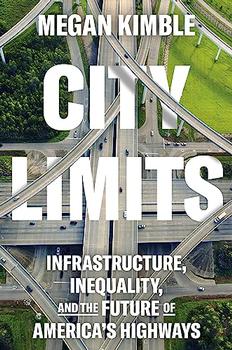
Infrastructure, Inequality, and the Future of America's Highways
by Megan Kimble
An eye-opening investigation into how our ever-expanding urban highways accelerated inequality and fractured communities—and a call for a more just, sustainable path forward
Every major American city has a highway tearing through its center. Seventy years ago, planners sold these highways as progress, essential to our future prosperity. The automobile promised freedom, and highways were going to take us there. Instead, they divided cities, displaced people from their homes, chained us to our cars, and locked us into a high-emissions future. And the more highways we built, the worse traffic got. Nowhere is this more visible than in Texas. In Houston, Dallas, and Austin, residents and activists are fighting against massive, multi-billion-dollar highway expansions that will claim thousands of homes and businesses, entrenching segregation and sprawl.
In City Limits, journalist Megan Kimble weaves together the origins of urban highways with the stories of ordinary people impacted by our failed transportation system. In Austin, hundreds of families will lose child care if a preschool is demolished to expand Interstate 35. In Houston, a young Black woman will lose her brand-new home to a new lane on Interstate 10—just blocks away from where a seventy-four-year-old nurse lost her home in the 1960s when that same highway was built. And in Dallas, an urban planner has improbably found himself at the center of a national conversation about highway removal. What if, instead of building our aging roads wider and higher, we removed those highways altogether? It's been done before, first in San Francisco and, more recently, in Rochester, where Kimble traces how highway removal has brought new life to a divided city.
With propulsive storytelling and ground-level reporting, City Limits exposes the enormous social and environmental costs wrought by our allegiance to a life of increasing speed and dispersion, and brings to light the people who are fighting for a more sustainable, connected future.
"Immersive ... By seamlessly combining an expansive history of urban anti-highway organizing with an intriguing up-close look at present-day Texas politics, Kimble delivers an invigorating window onto American grassroots activism." —Publishers Weekly (starred review)
"Kimble capably proposes a sustained rethinking of urban infrastructure... . A convincing case for removing highways and shaping cities meant for people, not cars." —Kirkus Reviews
"If your commute is a nightmare, or if you have had enough of the asphalt jungle that many America cities have become, read this book. It's an urgent dispatch from the front lines of the fight to reclaim cities from cars and highways and their legacy of racism, injustice, and climate change. City Limits is not just a compelling read—it's a road map to a better world." —Jeff Goodell, New York Times bestselling author of The Heat Will Kill You First
"As dams are to living salmon streams, highways are to living cities. Nothing could be more heartening than the growing movement—powerfully chronicled in City Limits—to move past this sad stage in our country's development, and on to something new and old that works for people, not cars." —Bill McKibben, author The End of Nature
"Megan Kimble turns the history of highway construction into something much larger: a treatise on power and possibility. City Limits proves that the world can change faster than we think." —P. E. Moskowitz, author of How to Kill a City
This information about City Limits was first featured
in "The BookBrowse Review" - BookBrowse's membership magazine, and in our weekly "Publishing This Week" newsletter. Publication information is for the USA, and (unless stated otherwise) represents the first print edition. The reviews are necessarily limited to those that were available to us ahead of publication. If you are the publisher or author and feel that they do not properly reflect the range of media opinion now available, send us a message with the mainstream reviews that you would like to see added.
Any "Author Information" displayed below reflects the author's biography at the time this particular book was published.
Megan Kimble is an investigative journalist and the author of Unprocessed. A former executive editor at The Texas Observer, Kimble writes about housing, transportation, and urban development for The New York Times, Texas Monthly, The Guardian, and Bloomberg CityLab. She lives in Austin, Texas.
Your guide toexceptional books
BookBrowse seeks out and recommends the best in contemporary fiction and nonfiction—books that not only engage and entertain but also deepen our understanding of ourselves and the world around us.